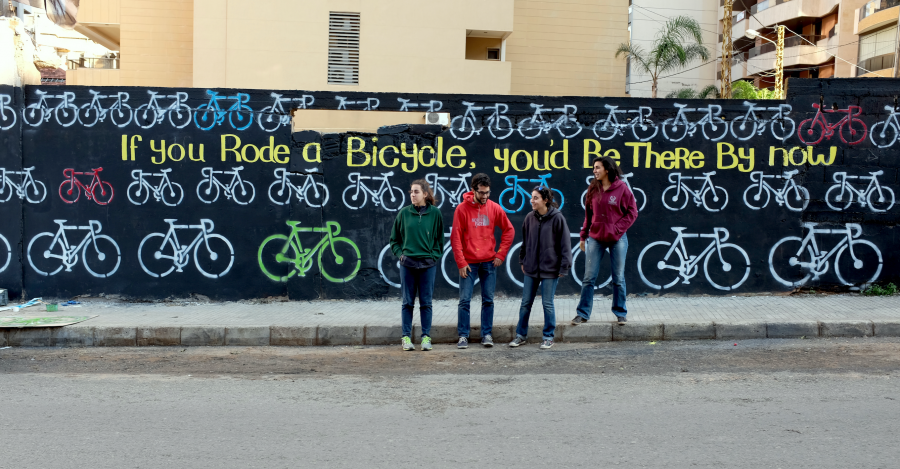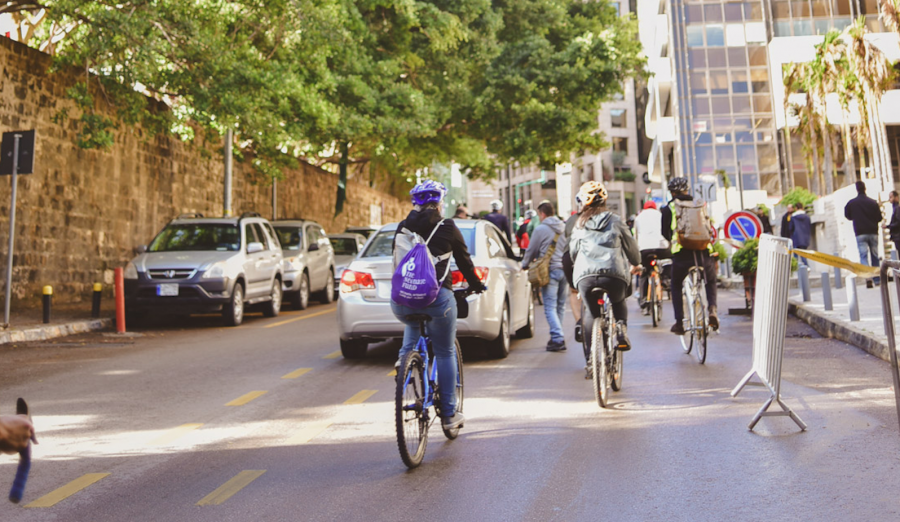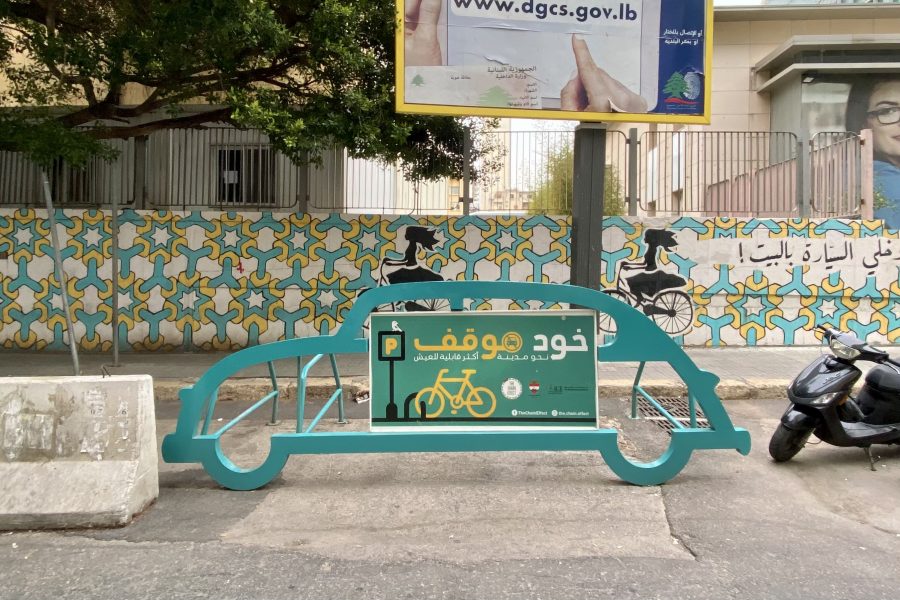9 min. read
Elena Haddad & Zeina Hawa are co-founders of The Chain Effect, a non profit promoting the bicycle in Beirut as a sustainable and convenient form of urban mobility and facilitating its use through street art, public interventions, community projects and holistic city planning.
How did The Chain Effect come to be, and what are some of its core principles?
Zeina: The Chain Effect started very haphazardly. Elena and I moved back to Beirut after living abroad and were working in the city. It was a nightmare to move around by car and we wondered why people didn’t cycle as much given how the city is quite small and compact. We used to make street art for fun and one day decided to create an impromptu mural about cycling. It was on the route of the Beirut marathon, one day before it took place, displaying a simple message for drivers: “If you were on the bike you would be home by now”.
It got a lot of attention on social media, so we decided to do some more murals and kept growing this activity, suddenly, finding ourselves with a core group of organisers. That led us to transition from an informal group doing street art to an official NGO in 2019 that now engages in new forms of awareness building.
Elena: The conversations that were generated after that first mural were so interesting. We started to choose places where there was a lot of congestion and that were the most visible. People would come and talk to us while we were painting, and even though some were not convinced, at least they were triggered to think about alternative forms of transport.

What are the main challenges for active travel and cycling in Beirut?
Zeina: There are many layers. The most immediate is physical infrastructure. Since the 1950s-60s, its development has been heavily skewed towards cars without any considerations for pedestrians, cyclists or other soft modes of transportation. The second is behavioural and cultural. We still aspire to buy a car, and not owning one still is perceived as a symbol of poverty. There are also perceptions around safety and people viewing cycling as a means of sport or recreation, not transportation. Access is also an important barrier. The bike market itself is very limited and geared towards sports cycling or leisure cycling, renting a bike along the seaside for example, but not much on city cycling.
Car travel is subsidised and incentivised in many ways, which creates an induced demand for more travel by car. When you are in a street where 90% of the surface area of the street is covered in metallic boxes and cars are allowed to park in any way they want, blocking the sidewalk, it creates a culture where people think this is the only way to move around. You are forced out of walking and cycling because the physical space is dominated by cars. When you look at statistics however, around 50% of trips in the greater Beirut area are less than 5km.
Parking is also a critical issue. In certain parts of the city it is free and lots of supermarkets, shops and offices pay for customer parking or have valet parking, which creates an artificial ease of driving by not having to think of where to park. Lack of political will, and subsequent lack of investment in public transport networks are the last two main challenges. Some public transport networks exist but are far from sufficient, often informal and inaccessible.
Elena: There are also no road safety directives or regulations. It’s the law of the jungle here, even driving a car is hectic. Laws that protect pedestrians and cyclists are not enforced and there is no dedicated infrastructure.

How do you see cycling as a tool for empowerment and greater wellbeing for the Lebanese society?
Elena: We try to highlight a lot of different benefits when we talk about cycling, such as physical and mental health, economy and social cohesion. If you think of our recent history, our cities have been completely segregated by policies over the past 50 years after the civil war and during the reconstruction. The bicycle can be a tool for freedom that allows you to explore the streets that you wouldn’t take by car and reconnect with neighbourhoods in a new way. When I go on a ride with Zeina, I constantly discover things I had never seen before because I had been in a car and would overlook it.
From an economic point of view, when you empower someone by providing them with a bicycle or by helping them realise they can get around on a bike as an alternative it can make a big difference. I think it can provide freedom of mobility for many people that otherwise wouldn’t have that choice.
Zeina: These vast benefits of cycling are heightened in a context like Lebanon, where people face so many societal, economic and environmental pressures. We are currently facing a fuel crisis which is really more of a fundamental transportation crisis than just a lack of fuel. People are currently unable to move around with fuel based options, so cycling could provide opportunities for people to access their necessities and jobs. From a societal perspective, I agree with Elena that being able to connect from different neighbourhoods is key. Certain areas of the city are labeled as dangerous or undesirable but having a bicycle can help you navigate certain areas of the city in a different way and break down these barriers that have been built up by years of conflict, civil war and fear of the other that has been used so much in politics to divide us.
What are some projects that you have carried out that have intersected with other groups involved in urban change or mobility in Beirut?
Zeina: We are in discussion with different entities involved in the built environment and mobility. There are lots of small entities focusing on cycling in different ways and we hadn’t sat together before to discuss a long term vision for walking and cycling in Lebanon and how our projects fit together.
One of the organisations whose work we admire and intersects with ours is Public Works Studio, who work at the intersection of spatial justice and housing justice, focusing on housing law and evictions. This is a very big issue in Beirut, with the real estate sector being such an uncontrolled monster. They do a lot of work that aligns with our vision of the city in a slightly different space.
We are also supporting Wave bike, a company that provides electric bikes for long term rent in Beirut with a monthly fee. We worked on short instructional videos on how to cycle in traffic in Beirut, and are preparing small cycle training and education programs with them.
Elena: We also worked with the American University of Beirut’s neighbourhoods initiative, focusing on the university’s relationship with its surrounding neighbourhoods through social, environmental and physical projects. We installed, as part of Beirut Design Week, a bike parking facility with them to show how much space car parking takes compared to 10-12 bikes. This project illustrated well the barriers we face in terms of political will. The municipality was doing roadworks last year and they decided this bike parking wasn’t valuable enough so they destroyed it. We had to come back and reinstall it, in a way to say “you destroy and we create and add value to our streets”. It shows how we are in constant conflict with our government.
Another project we have conducted is a crowdsourced map that shows bike friendly routes. Even though we don’t have dedicated cycling infrastructure, we have tried to optimise cycling in our current context through preferred routes. Even when there is no dedicated plan, we can still start and lay the groundwork.

In the face of such incompetence from the government, will you continue with tactical approaches or do you also see a need to try and collaborate with public institutions in the future?
Zeina: There is a lot of room for more tactical urbanism interventions. There is a public sector void here, and as long as it’s there, as many studies or research projects can be made but the delivery of these projects will remain in the realm of fantasy. We want to try to expand our tactical interventions however and have them be a case study or a model for what can be done if we focus on a more human vision of the city. In Beirut, it takes time to achieve these pilots, even though tactical urbanism should be fast and low cost.
We have very limited resources, and there is a bit of fatigue from having meetings with entities in the hopes of creating some new initiative and pushing forward, because at the end of the day the work is slow and gruelling. We have had some positive meetings with people but the missing link is the implementation.
Elena: At the beginning we were doing more of our own initiatives on the ground but, a few years ago, we started to try and lobby more to push for concrete change. We did something called Cycling 2030, placing in discussion people from the cycling scene, urban design, municipalities and the ministry of environment. It’s very demoralising because again, there is a lack of interest and capacity for implementation. We are from civil society, so economically and time-wise it is complicated. We are all volunteers, and the government often blocks us due to regulations. We would like to, of course, try to elevate our calls to a higher level but given the circumstances it’s very challenging..
This has made us really think about what our efforts can achieve today. We have started to talk to other NGOs and advocates related to mobility on the ground, such as Riders Rights, Train/Train, and the Bicycle Mayor in Tripoli. Together, we set a position paper on our long term vision for transportation. Now we want to consolidate our ideas to see what we can do as core groups on the ground to help alleviate the daily issues and crises people are facing in regards to mobility. It’s a struggle, I’m not going to lie, but we are doing our best.
Where do you see this coalition going, with an emphasis on mobility justice, what would you like to contribute to the future of transportation in Beirut?
Elena: This is a great but tough question. Again, there is a short term and long term answer. From my perspective, we want to be able to at least provide freedom of mobility, the freedom of choice, whether it’s strengthening the existing bus network, creating relatively safe bike lanes, crosswalks, intersections. We want to change our streets in a way that more people have alternatives and access to an interconnected transport system where they don’t need to rely on the car. That was the case in Lebanon when our grandparents were young before the war. People could go down from the mountain on the bus, and continue on the coastal train to Beirut and then use the tram or walk. They didn’t have these barriers we have today.
Zeina: In regards to cycling, I think one of the big missing links is the lack of affordability in the current bicycle market for the average Lebanese person. We had started an access to affordable bikes campaign during the COVID-19 crisis when public transport was halted. The economic crisis was growing, currency devaluation has been crippling. So, this is one space where we want to keep fundraising and expand. We want to create awareness that there are alternative choices and facilitate people to get there.

